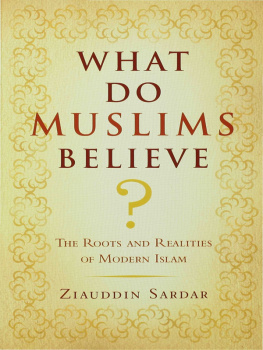Toyib Olawuyi - On The Khilafah Of ‘Ali Over Abu Bakr
Here you can read online Toyib Olawuyi - On The Khilafah Of ‘Ali Over Abu Bakr full text of the book (entire story) in english for free. Download pdf and epub, get meaning, cover and reviews about this ebook. year: 2017, publisher: Books on Islam and Muslims, genre: Religion. Description of the work, (preface) as well as reviews are available. Best literature library LitArk.com created for fans of good reading and offers a wide selection of genres:
Romance novel
Science fiction
Adventure
Detective
Science
History
Home and family
Prose
Art
Politics
Computer
Non-fiction
Religion
Business
Children
Humor
Choose a favorite category and find really read worthwhile books. Enjoy immersion in the world of imagination, feel the emotions of the characters or learn something new for yourself, make an fascinating discovery.

- Book:On The Khilafah Of ‘Ali Over Abu Bakr
- Author:
- Publisher:Books on Islam and Muslims
- Genre:
- Year:2017
- Rating:5 / 5
- Favourites:Add to favourites
- Your mark:
- 100
- 1
- 2
- 3
- 4
- 5
On The Khilafah Of ‘Ali Over Abu Bakr: summary, description and annotation
We offer to read an annotation, description, summary or preface (depends on what the author of the book "On The Khilafah Of ‘Ali Over Abu Bakr" wrote himself). If you haven't found the necessary information about the book — write in the comments, we will try to find it.
On The Khilafah Of ‘Ali Over Abu Bakr — read online for free the complete book (whole text) full work
Below is the text of the book, divided by pages. System saving the place of the last page read, allows you to conveniently read the book "On The Khilafah Of ‘Ali Over Abu Bakr" online for free, without having to search again every time where you left off. Put a bookmark, and you can go to the page where you finished reading at any time.
Font size:
Interval:
Bookmark:

This text provides evidence for the Caliphate of Imam Ali (AS) over Abu Bakr using differents Traditions such as Hadith Al-Wilayah,Hadith Al-Tawliyah, and Hadith Al-Wirathah.
Special thanks to Tural Islam, Aneela Sultan, Ali Baker, Syeda Umme Rabab Bukhari, Ahmad Olawuyi, and the following brothers and sisters, for their encouragement: Shaykh Muhammad Nura Dass, Steve Davies, Jaffer Abbas, Jibreel Ibn Mikael, Jafar Mer, Muhammad Ali Khalil, Hassan Bokhari, Syed Jarry Haider, Omidiji Nurudeen, Kassim Agbonika Salihu, Aquib Mehdi Rizvi, Syed Ali Raza, Sajjad Abu Jafar Baktash, Akram Abbas, Ali Hussnain, Nader Carun, Henna Rai, Rizziandrie Zairul, Kashif Bukhari, Syed Mansab Ali Jafri, Nasir Hasan, and Hussain Ali Nasser. May Allah bless them all and all our loving brothers and sisters from the Shiah Imamiyyah and the Ahl al-Sunnah wa al-Jamaah.
Two questions stand at the centre of the Sunni-Shii disagreement:
(i) Did the Messenger of Allah, sallallahu alaihi wa alihi, ever appoint any khalifah to stand in his command position and substitute for him in his command roles after his death?
(ii) If he did, who exactly did he designate?
Our brothers from the Ahl al-Sunnah resolutely submit that the Prophet never appointed a khalifah. Rather, he according to them died without any designated heir to his command, and gave no indication whatsoever as to the method of appointing future commanders of the Ummah. Therefore, any Sunni Muslim can become the Sunni caliph by inheritance, or through a popular vote, an electoral college, a coup, or an armed rebellion. By contrast, the Shiah Imamiyyah argue that the Messenger of Allah actually appointed twelve khalifahs from his bloodline by Divine Order - to assume his command roles after him. In line with the Shii doctrine, the first of these khalifahs was Amir al-Muminin Ali b. Abi Talib, alaihi al-salam, followed by Imam al-Hasan, alaihi al-salam, then Imam al-Husayn, alaihi al-salam, and then nine others from the progeny of al-Husayn, alaihim al-salam. The twelfth of them, according to Shiis, is Imam al-Mahdi, alaihi al-salam.
Another crucial difference between the Sunni and Shii positions is outlined below:
1. Acording to Sunni Islam, it is primarily political and military power which determines legitimacy. Therefore, whoever is to seize full political and military control of most of the Sunni communities is their legitimate khalifah. Whoever is not able to achieve that is not the khalifah.
2. On the other hand, Shiis maintain that it is only divine appointment that determines legitimacy. Even if the divine appointee is denied political or military power, he still remains the legitimate khalifah. Whoever exercises political or military control over him is nothing but a rebel, and so is whosoever fails to recognize his authority. All the messengers of Allah, alaihim al-salam, were commanders of their respective Ummahs till their deaths. Yet, most of them were denied both political and military authority. That, of course, never stripped them of their legitimate command over even the rebel leaders.
However, there are authentic ahadith in the Sunni sources which firmly establish that the Prophet by the Command of Allah - did appoint twelve khalifahs from his bloodline, with the first of them really being Ali! This then is exactly where the supreme problem lies for the Sunni claims, and - of course the entirety of Sunni Islam as a whole.
The khalifah is the one who takes the place of another one, who is physically absent for one reason or another. Imam Ibn al-Athir (d. 606 H), an ace Sunni lexicographer, explains:
The khalifah is whoever stands in the position of the one who is physically absent and substitutes for him.
So, the khalifah is basically the substitute of the one who is physically absent. The cause of the absence does not matter whether distance, death or others. What is important is that someone who occupies/occupied a certain position is physically absent, and another the khalifah substitutes for him in it. This often happens in football matches. A player is substituted by another who then plays his exact role on the pitch. The substitute is the khalifah of the substituted footballer. With regards to our Ummah, the Messenger of Allah is our amir (commander). His command endures over, and binds, all Muslims civilian and military - till the End Time. In particular, he had, and still has, full command of all Muslim armed forces. No Muslim can ever validly claim that the Prophets command has ceased over any of the believers. None has ever, and none will ever, do such. The Messenger of Allah is, and will forever remain, the amir of the believers (amir al-muminin).
However, it was impossible for the Prophet to personally exercise all his command roles over the Ummah, even during his lifetime. Therefore, whenever he was unable to do so by himself, he used to deputize people to fill the roles for him. Whoever he appointed was therefore known as his amir (i.e. the amir appointed by him). Imam Ahmad (d. 241 H) records one of his explicit instructions concerning such deputies:
Abd Allah (b. Ahmad) my father (Ahmad b. Hanbal) Ruh Ibn Jurayj Ziyad Ibn Shihab Abu Salamah b. Abd al-Rahman Abu Hurayrah:
The Messenger of Allah, peace be upon him, said: Whosoever obeys me has obeyed Allah and whosoever disobeys me has disobeyed Allah. Also, whosoever obeys myamirhas obeyed me, and whosoever disobeys myamirhas disobeyed me.
Shaykh al-Arnaut says:
Its chain is sahih upon the standard of the two Shaykhs.
These amirs were generally appointed either as army commanders or civilian governors. In the latter case, they were also referred to as khalifahs. They stood in the position of the Messenger of Allah often in a limited capacity and substituted for him within his Ummah. The question then is about the command roles of the Prophet after his death. Did he appoint amirs to fill them for him or not? He knew for certain that he was going to die one day, and would no longer be able to personally perform his command roles at all anymore within his Ummah. So, what did he do about these roles? Did he follow his Sunnah of appointing amirs to perform them for him whenever he was unable to do by himself? Or, did he abandon his own Sunnah?! Our brothers from the Ahl al-Sunnah say: Yes, he abandoned his own Sunnah!
He knew that he still had those roles in his
Font size:
Interval:
Bookmark:
Similar books «On The Khilafah Of ‘Ali Over Abu Bakr»
Look at similar books to On The Khilafah Of ‘Ali Over Abu Bakr. We have selected literature similar in name and meaning in the hope of providing readers with more options to find new, interesting, not yet read works.
Discussion, reviews of the book On The Khilafah Of ‘Ali Over Abu Bakr and just readers' own opinions. Leave your comments, write what you think about the work, its meaning or the main characters. Specify what exactly you liked and what you didn't like, and why you think so.










